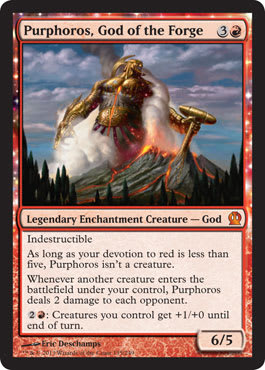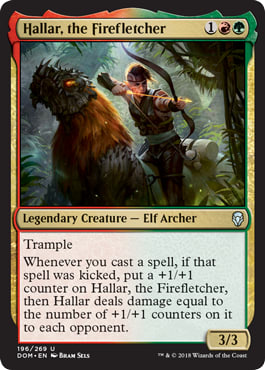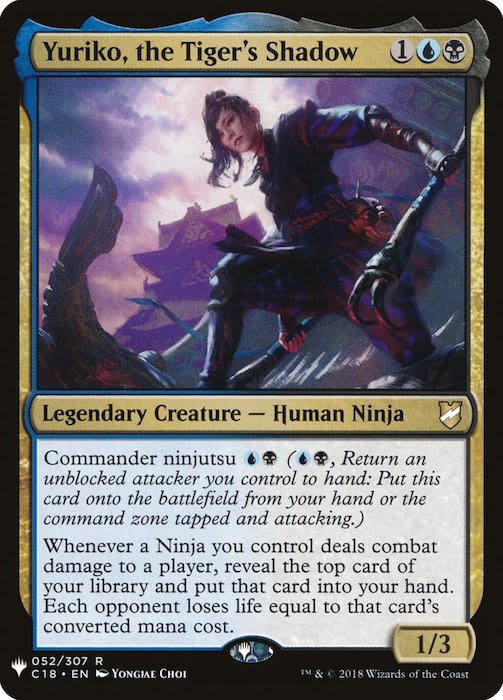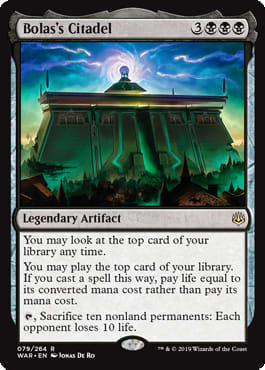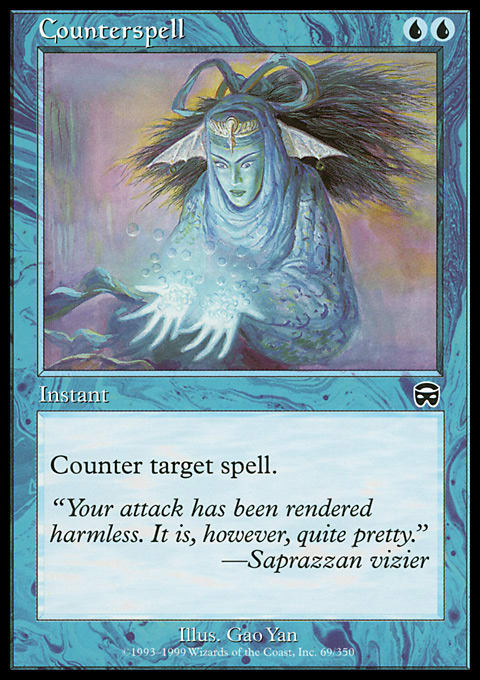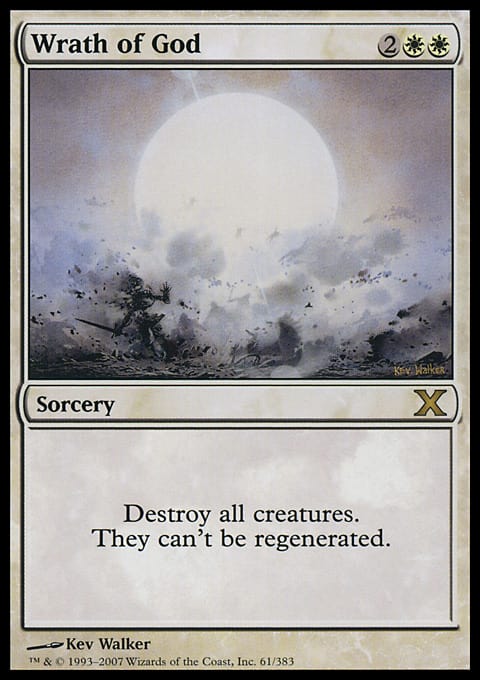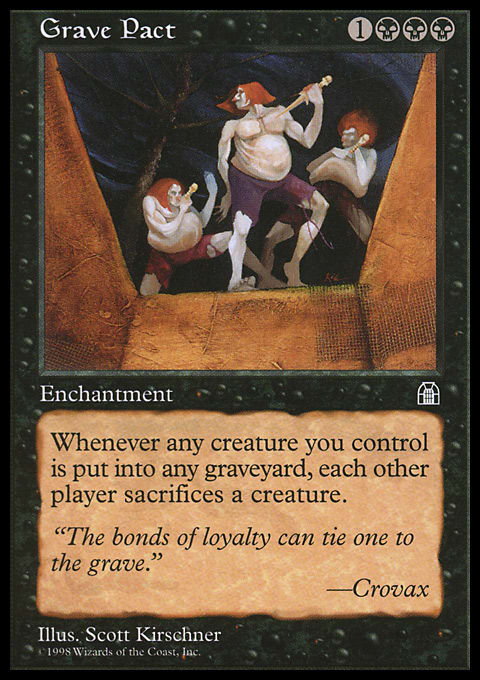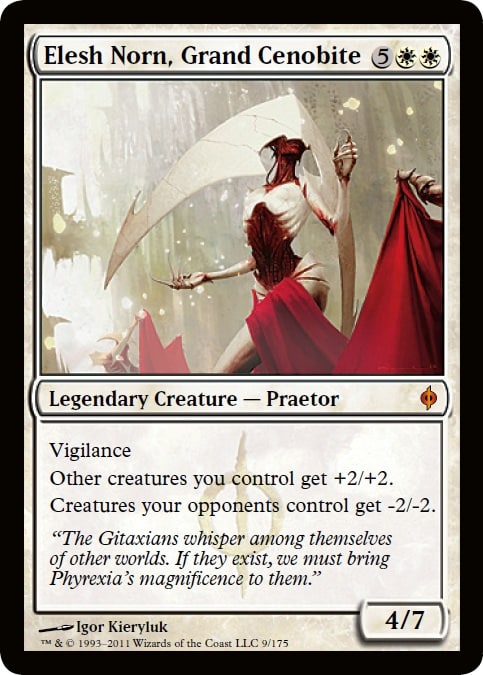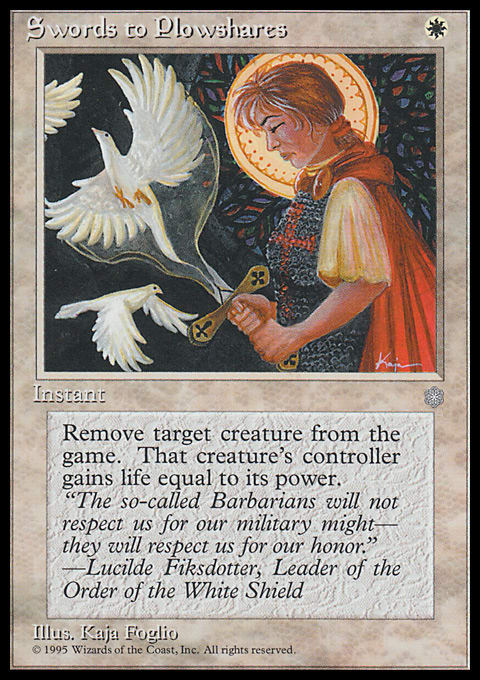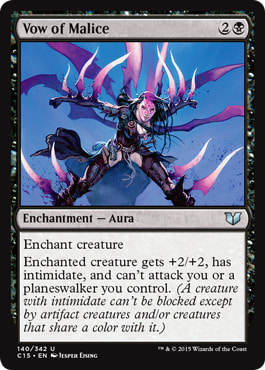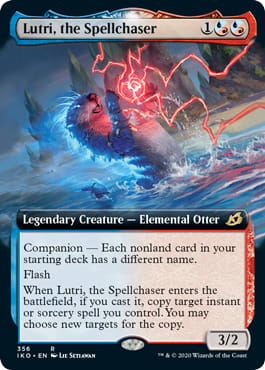
ountain Landscape with River Valley and the Prophet Hosea by Gillis van Coninxloo (1585). Ondu Giant by Igor Kieryluk.
Despite my many decks and columns that edge in the direction of powerful cards, nasty combos, and competitive strategies - in my heart I am a filthy casual.
I enjoy playing at tables where games don't always end in a combo, or before turn 10, or with one player sitting out for an hour because they happened to not have a blocker, a Fog, or removal on turn four. I really like when a group of friends plays not with the goal of winning as soon as possible but of watching an epic struggle unfold on the battlefield in front of them, whether it takes an hour or three hours.
Why do I often seem to be so focused on combos and high power, semi-competitive deck-building?
We're all the product of our metas, and I happen to play at an LGS where combos, high-power cards and game-breaking synergy isn't exactly frowned upon. I still sometimes play casual decks, but often I find myself sitting with my durdly, "fair" deck, watching someone play out something on the level of Omniscience/Enter the Infinite and wishing I had played a better deck. I don't blame them, nor do I think they're necessarily pubstomping. When you play a lot, you run face-first into the occasional buzzsaw. Sometimes you're the one delivering the epic beatdown and sometimes you're the one sitting there with a silly five-color cycling deck wishing you had played something a bit better.
Sometimes you're the hammer.
Sometimes you're the nail.
If you're doing it right, in the long run things will even out and you'll have lots of great games despite the occasional dud. I don't even think it's wrong to enjoy those occasional blowouts if you're on the winning side - provided your goal isn't to always be pubstomping.
I try to lean toward building decks with more interaction and the ability to combo out because I play at a lot of tables where that's totally fine. Sometimes I wind up playing at a table where my deck has the capability of dropping the proverbial "turd in the punch bowl." That can be a hard thing to avoid, or at least a hard thing to resist. If you haven't hit a certain combo in a deck in a long time, you're at a casual table, and you have the chance, you might just go for it. The table might be annoyed with you, but I think it's OK to go for it. Combos are part of our format, whether you like them or not.
In general, when I'm playing at a casual table or I think I'm at a casual table, I try to follow a few basic guidelines so that everyone hopefully has fun.
Today's Commanderruminations is a look at ways I try to approach the game when I'm in a casual environment. I don't always succeed at following these, but I do my best and I think it's a topic worth diving into. Before we get our scuba gear ready, we should define our terms.
Casual Considerations
You could argue that Commander, outside of tournaments and league play, is inherently casual. You'd have a point, but I'm less concerned with the stakes you are playing for and more concerned with what power level your deck is at.
Casual does mean playing for no stakes.
Casual also means playing with some expectation that the game isn't going to end out of nowhere and there's a general sense that everyone is invested in having a fun experience.
Those are two very different interpretations of the same word.
It's worth noting that one person's idea of "fun" might be very different from another person's. Most games of cEDH are "casual" (no stakes) games where everyone is trying to have fun. The trick is that you don't know what a new player's idea of "casual" or "fun" will be. Talking about power levels before the game won't always make it clear what kind of game players are looking to have. That conversation helps, and it is important, but at some point in time we've all been surprised by a tablemate who was clearly not on the same page as everyone else when having that Rule Zero discussion.
For today, "casual" means playing a game where you really care about everyone enjoying themselves and you are generally trying to avoid having anyone leave the game feeling badly about the experience. You might ostensibly be trying to win, but that isn't as important as both trying to have fun and trying to avoid spoiling someone else's fun.
Rule One: Spread the Love
By "love," I mean damage.
I have built my fair share of voltron decks and I sometimes have big scary creatures on my side of the board. If I've got an unblockable 3-turn kill with hexproof, the "right" choice is to eliminate the opponent most likely to be able to eventually stop you from winning the game. Either that, or the Blue player, because screw that guy always holding up mana for their Swan Song or Flusterstorm and thinking he's so much smarter than the rest of you.
The thing about making the "right" play in Commander is that games can last for hours. People take time out of their lives to come play a game with you. Playing a game does involve the risk that you'll be the first one knocked out, but I really hate to be the one to tell a buddy they've got to sit out until the next game starts. It sucks to be that guy and it feels bad to be responsible for their early exit - especially if it's twenty minutes into what winds up being a two-hour game.
For that reason, I spread my damage out, not only to avoid making any real enemies, but also because nobody really wants to be out early. Even at an LGS where you might be able to look at cards or jump into another pod, if the feeling of the table is that we're playing a casual game I will go out of my way to "spread the love."
I also favor decks that will spread damage out on their own. Purphoros, God of the Forge, Hallar, the Firefletcher, Nekusar, the Mindrazer, Yuriko, the Tiger's Shadow and a few others are all good at pushing damage out to everyone. This can backfire if the table decides to gang up on you but at least you know when that happens that it's your own fault for playing a deck like that. It doesn't feel any better, but it's easy to understand.
If you're looking at Yuriko, and to a lesser extent Purphoros and thinking I'm crazy to talk about playing them in a casual context, please remember that any commander can be built at nearly any power level. A highly tuned Yuriko, the Tiger's Shadow cEDH build isn't a good fit for a casual game, but my point isn't that this or that commander is or isn't casual. Pushing out damage to the whole table is a pretty fair and egalitarian way to deal with playing casual Commander and these commanders give you an easy way to spread out your damage.
One might suggest that a lot of combo decks will kill the entire table at once. While that's true, not all casual groups enjoy playing against combo so I try to pay attention to who I'm playing against. If I'm with experienced players, I might break out a combo deck and not think twice. If I'm with younger or less experienced players or just players with much lower-powered decks, they often don't want to deal with combo in a casual game.
I try not to break out my black belt moves if I'm sparring with a bunch of white belts. Of course, that's being kind to myself - my best moves might not even qualify as black belt, but I think you get what I mean.
Rule Two: Have a Reason for Everything
I don't mean that I have to have a GOOD reason for everything I do, but I should have a plausible explanation for my in-game decisions.
That means I won't roll a die to see who I attack.
Even an early game, 1-power creature will generally attack for a reason. I might hit a player who is playing a White deck with the argument that they probably have lifegain in their deck. I might hit a player who is playing a commander that I think of as being stronger than the other commanders at the table. My reasons might be weak, but I try to have some explanation for why I'm swinging at an opponent if it isn't already obvious. Highest life total is always an easy out - if someone is at 41, bring them back down to 40 and nobody will bat an eye.
This holds true for removal, especially if I find myself playing a removal-heavy deck at a table with players who aren't used to a lot of interaction. It's usually not a bad idea to save removal for later in the game anyways, but if I'm going to blow up something I like to explain myself.
A newbie who threw a Bolas's Citadel into a janky deck might be surprised to see me pull out all the stops just to get it off the table. I'll definitely explain that I've seen it win too many games to just let it stick around. It might not have been the threat I made it out to be, but it's worth letting them know that they're playing with a powerful card and the correct move is to get rid of it.
Having a reason for "everything" also puts you in the position where you're actively thinking about why you're doing what you do.
It helps to focus your mind and gets you into the habit where you're less likely to miss an opportunity in less casual games. If nothing else, it's a better habit than not thinking about what you're doing and just randomly attacking and targeting stuff for the "fun" of being random. That might seem cute, but it won't make you a better player and your tablemates probably won't appreciate it as much as you think they will.
Having a reason doesn't mean saying it every time. That would be exhausting, but if someone questions why you're swinging at them again and again it's nice to be able to have not only an answer but a plausible answer that makes sense.
Rule Three: Let Them Play
When I'm playing a casual game, I want to be able to play my deck. It stands to reason that I should expect my friends to want to play their decks as well. That means I generally avoid strategies that won't let them do that.
I'm not suggesting these are cards you can't play in casual games. You can, and you should play them - they're essential parts of the game. I just try to avoid leaning on any of these strategies too heavily.
It's relatively easy to play a counterspell-heavy deck and to shut someone out of the game entirely, especially if they're not playing Blue. In some situations, it's even the right thing to do, but I really shy away from playing heavy control strategies in casual games. Casual decks are often centered around their commander. Never being able to resolve the centerpiece of your deck - especially if that deck isn't really that powerful - sure doesn't make for a fun game.
I've also built a few Wrath-heavy and forced-sacrifice themed decks over the years. I ran a Golos, Tireless Pilgrim deck around boardwipes, guildgates and Maze's End. Letting your opponents play their creatures onto the board is great, but if you're wiping the board or forcing them to sacrifice them every few turns, you're not really letting them play their creatures. It's like letting someone buy an ice cream cone but slapping it out of their hand every time they raise it up to their mouth.
Mind Control and Treason effects have the same problem. If you let your friends play creatures, but they're never able to keep their best creature, you're not really letting them play. Instead of slapping that ice cream cone out of their hand, you're grabbing it from them and eating it in front of them (or just beating them to death with it).
Decks that revolve around completely shutting down a strategy, like Elesh Norn, Grand Cenobite does against token creature decks, is an example of completely ruining the fun for some of your opponents. With the worst of the Praetors I'd suggest that they simply aren't suited for casual play.
Are these cards and strategies legal in Commander?
Of course, and I even run some of them in my more casual decks. I just don't think it's great for a casual game to deny your opponents the chance to actually play their deck. If you're popping their commander with some removal every single time they put it onto the battlefield, you're not playing a casual game and you're probably going to have an unhappy tablemate. If you don't care whether other players are having fun - you're not playing a casual game of Commander.
Instead of not letting your opponents have their stuff, I try to lean toward removing attacking creatures if they're coming at me or just discouraging opponents from attacking me in the first place. Keeping a big creature from hitting you is very different from keeping your opponents from having that big creature at all.
It's often better to just take the hit or lose a blocker and save your single target removal for a bigger, scarier threat later in the game. If your opponents are playing with an equally casual mindset, they might also be spreading out their damage so you might get a pass for a few turns before that big beastie heads your way again.
It's worth noting that if your opponent is playing such a dangerous commander or such dangerous permanents that your only course of action is to remove them, then do so.
Playing casually means that you might all be trying to win but nobody is trying to break the game wide open. If someone plays Purphoros, uses Pyromancer's Goggles to put a big Goblin Offensive on the stack and they were silly enough to let the big guy become a creature - by all means hit it with that Swords to Plowshares! Just don't Imprison Purphoros in the Moon the second it hits the field unless you really need to do so to survive.
Use your removal but use it judiciously and don't keep your friends from playing. Keep them from winning, if you can. Any reasonable player will understand when you do that, even if they find it frustrating at times.
Rule Four: Be Forgiving
Every time I play, someone does something that they would like to take back. Maybe they tapped their mana wrong. Maybe they played the wrong creature. Sometimes they screwed up the order in a sequence and should have put the cards on the stack in a different order. I've swung into a Maze of Ith on an opponent's board that was just sitting there right in front of me.
We all make mistakes.
If there's ever a time and a place to let someone roll back a mistake, it's in a casual Commander game. There's nothing at stake, everyone is trying to have fun, and a little forgiveness and understanding can go a long way toward helping someone stay in a good mood when they might just be pissed at themselves for screwing up a play. I never get more upset than when I'm upset with myself and I'm sure I'm not alone.
That doesn't mean it's necessarily the best thing to constantly be rolling things back. I personally try to err on the side of living with my mistakes on the theory that I might eventually learn and make them less often.
I don't mean to suggest that you have to let someone fix an obvious misplay that would have killed a player or ended the game. Pretty much everything else is negotiable, but if an opponent screws up their wincon most players will understand when a table is reluctant to let them go back and fix their mistake.
As an extension of this, I'd urge you to not use the mechanics of the game as a weapon against other players who are still learning.
If someone makes a mistake declaring attackers, let them make adjustments. Try to impress upon them that they should work on getting better at going through the steps of a turn clearly and thoughtfully, but in a casual game I think it's entirely appropriate to let an opponent make adjustments as they're figuring things out until they've got the attack that they really want.
Rule Five: Be Flexible
When you're not playing in a competitive environment and you're not playing for any sort of prize, there's no real reason to get all worked up about little things like rules, right?
Well, that's not really true. Rules matter and you should learn and play by the rules of Magic.
Where I try to be flexible in casual Commander is with deck-building constraints.
Did you build your deck with a banned card?
No problem. We can see how busted it is in this game, and now that you know the card isn't legal in the format, please replace it before you play the deck again.
Did you build a deck with a legendary creature from one of the un-sets?
Cool, I'm sure it'll wind up being a weird game and it's probably not stronger than lots of really busted commanders that are already legal in the format.
Did you proxy a bunch of cards in your deck?
Well, if our meta isn't running proxies, you probably shouldn't be running proxies here, but we'll play and if they happen to deliver you the win, we'll put an asterisk on this meaningless game in our imaginary record books.
Usually the worst thing that will happen to you if you enter into a game against some crazy, illegal deck is that you'll lose a meaningless game and you might not have fun. It might be annoying if you're like me and you tend to focus too much on the outcome and not enough on the overall experience, but knowing the winner cut a few corners and broke a few rules to get their win can actually help. Sure, they won, but they won with Griselbrand in the command zone, or they won with a fully proxied set of dual lands for their five-color deck when nobody else was using proxies or duals. Play the game, make the best of it, and then try to get the player to adjust to your meta for the next time they play with you.
I really don't encourage players to walk into blind metas (where they don't know the local rules) and assume that something out of the ordinary, like banned cards, Un-set cards, proxies or anything else will automatically be embraced. I wouldn't build a Partners deck with Griselbrand and Rofellos, Llanowar Emissary and not expect to get a few raised eyebrows if I tried to play it in an unfamiliar LGS. That doesn't mean someone wanting to play that deck is a bad person or is necessarily trying to create a miserable game experience for their tablemates. Sure, it's weird and I'd expect them to know their deck isn't legal, but that doesn't mean I wouldn't agree to play a game with them. The worst-case scenario is that I lose in a casual, meaningless game of Commander. Losing a game is just not that big a deal.
#freelutri
I actually built a deck in paper that has Lutri, the Spellchaser as the commander (not as a companion). I'd never assume a group would be OK with me playing it, but I might ask and hope for the best. It's fun and Lutri isn't nearly as powerful as lots of other commanders, but Lutri is banned in the format because of its ridiculous Companion ability. My Lutri deck has won a few games, isn't overpowered and it doesn't seem to make for an unpleasant experience.
I would definitely urge you to let me play my Lutri deck and let other players try out new things as well. If you don't like it, or don't appreciate what I'm bringing into your playgroup, you can always tell me to not play it in the future, but for a game or two I think it's just the right thing to just give new things a try.
So the card ruined your game, or the jerk with the proxied cEDH mana base crushed the table in part because nobody had proxied their decks up to that power level?
It's just a game.
Let them know if it really wasn't fun for you or wasn't appreciated, but move on.
Give weird stuff a try, but you don't have to regularly allow it in your meta. Be flexible, but in the end it's up to you to make sure your playgroup is playing the kind of Commander that you enjoy.
Final Thoughts
I struggled to keep today's list at 5 "rules." There are lots of things I could have added, but I've probably done enough pontificating for one column. Here are a couple of tidbits that I've got to mention, but that might not need to be flushed out fully.
Pay attention to how your tablemates are doing. If someone just lost a job, or got dumped by their significant other, maybe it's not the night to knock them out first and have them sitting for an hour. That literally happened to me in my playgroup's first EDH gaming session after my mom died. It was the worst. I really needed a good night that night and I didn't get it. Pay attention to your friends and your tablemates and if you're playing a casual game, take into account more than just the cards on the table and the players' life totals.
I'm a firm believer that if you win a game - and especially if it's a blowout - it's courteous to switch decks and often to power down if the rest of the table isn't powering up. I have a lot of decks at a wide range of power levels, so I'm able to do that pretty easily. Suggesting that you all should switch if you crush a table isn't that helpful if you've only got one deck. For example, you could borrow a deck, but someone new to the format and excited about their new build shouldn't feel like they're getting punished by having to switch just because they won a game.
I think the most important, most fundamental takeaway I'd want to leave you with is that the "casual covenant" means that we all want each other (and ourselves) to have fun and we play accordingly.
That will mean different things for different playgroups. The suggestions I've laid out today might not fit your meta, or they might be nowhere near enough for your group, but if you are all playing with an eye towards each other's enjoyment of the game, I think in the long run you'll be all right.
I would urge casual players to learn to play at a higher level. It can be brutal and you can have some pretty un-fun games, but you get used to it and once you adjust, it can be a heck of a lot of fun. Semi-competitive and cEDH games are amazing things and once you get past the learning curve, I bet you'll find it was worth it.
That's all I've got for you today. Thanks for reading and I'll see you next week with another installment of Winning Ways - my monthly focus on ways to try to push up your personal win rate.
















